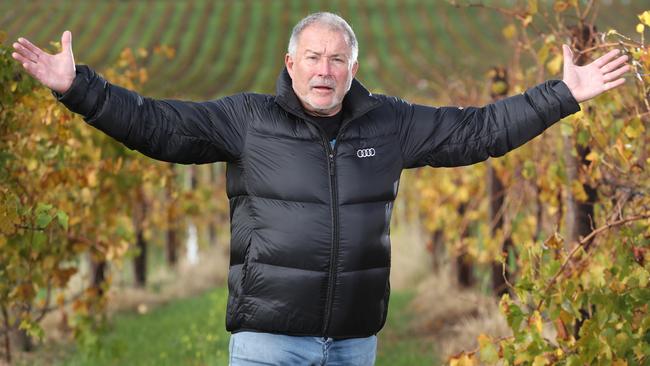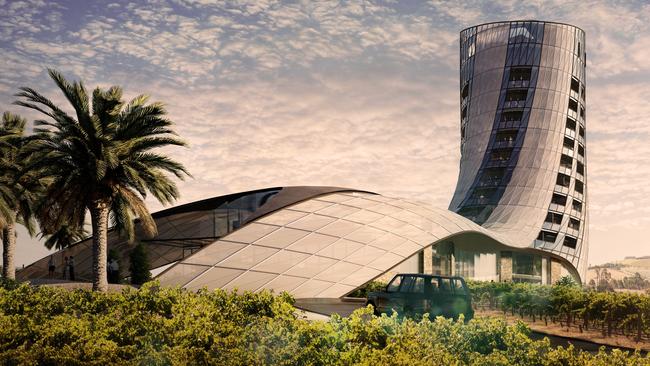Controversial $50m Oscar hotel in the Barossa Valley moves a step closer after court win
The controversial Oscar hotel unkindly nicknamed “the slug” by some locals has moved a step closer after a court ruling.
Barossa, Clare & Gawler
Don't miss out on the headlines from Barossa, Clare & Gawler. Followed categories will be added to My News.
A controversial $50 million hotel proposed for Seppeltsfield in the Barossa Valley has moved a step closer after the project’s opponents lost a court bid to have it moved into a tougher development category.
Seppeltsfield owner Warren Randall hailed the verdict and said “justice has been heard and served’’.
However, Mr Randall said he would be reaching out to those who oppose the 50m tall, 71-room hotel – and nicknamed the hotel ‘the slug’ – to try to convince them of the merits of the Oscar. He also said it was possible there would also be public meetings to discuss the project which would “help the whole Barossa’’.
“I don’t think anyone would not want a six-star resort for the Barossa,’’ he said.
The project has divided the Barossa and respected wine identities Robert O’Callaghan, James Wark, Marg Lehmann and food legend Maggie Beer all voiced objections but Mr Randall said he wanted to sit down with them all to explain the development.

On Monday, the Environment, Resources and Development Court ruled the six-star hotel had been correctly classified as a category two development by the Light Regional Council and did not meet the criteria for category three.
A category two development means only immediate neighbours can lodge an objection and have 14 days to do so and no appeal rights. A category three would mean anyone, anywhere in the state, could object and appeal rights are preserved. Eleven of 14 neighbours lodged objections and several residents had joined forces in court to fight the proposal.
On April 9 last year, new regulations came into force under then-state planning Minister and outgoing Barossa MP Stephan Knoll, which made it easier for tourism accommodation to be built in regional areas if it was valued at more than $3m.
A spokesman for the Barossa Regions Residents’ Association, James Lindner, said last year’s rule changes were “a massive attack on democratic process. It has bypassed community and taken away their ability for meaningful engagement and appeal’’.
“Barossa’s Economy is and always has been driven by the wine brand which is underwritten by its agricultural, viticultural and natural landscapes,’’ he said. “Anything that threatens the integrity of Brand Barossa is fundamentally threatening its economic driver.’’
Part of the legal objection focused on whether the land on which the hotel is to be built was part of the Seppeltsfield winery’s heritage listing.
The 44-page ERD judgment by Judge Michael Burnett and Commissioner Alan Rumsby found the vineyards surrounding Seppeltsfield did not apply to the land.
“There is no evidence that the proposed development will materially affect the heritage value of the place,’’ the judgment reads.

Luxury Hotels Australia director Toby Yap said The Oscar was “expected to bring an additional $90 million in tourism expenditure to the region over the first five years’’.
Mr Randall said the project still had to go through development and planning approval processes but he was hopeful that construction would start early next year. He said it would take up to two years to complete.
He acknowledged the design would “polarise’’ opinion but said the location had been lowered by 10m so it would not be as visible.
“It’s not going to be an eyesore at all as seen from the road,’’ he said.
More Coverage
Read related topics:Urban and Regional Development




